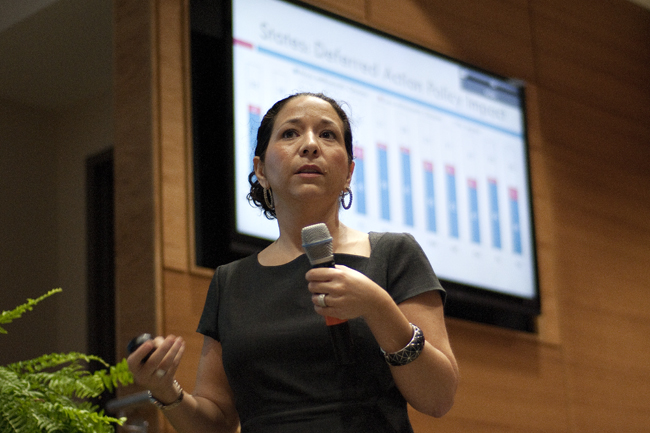For most of the country, the 2012 presidential election served its primary purpose — determining who will be the president for the next four years. For analysts and political scientists, the election serves as a source of data that can provide insight into the American electorate.
Examining voting behaviors was the goal of the New Politics Forum’s 2012 Post-Election Debriefing Conference, a series of TED Talk-style speeches and panel discussions hosted by the Annette Strauss Institute for Civic Life Friday.
Talia Jomini Stroud, associate professor of communication studies and assistant director of the institute, said media consumers increasingly insulate themselves with news marketed toward their specific partisan beliefs.
“When we look at the news media, we don’t look with a blank slate,” Stroud said. “Our partisanship colors the way in which we view the media. A consequence of that is if you lean to the political left or the right, putatively neutral news media seems a bit biased in favor of the opposition.”
According to a study by Pew Research Center released two weeks before the election, cable news television and the Internet were the No. 1 and No. 3 sources for campaign news. In contrast, in 2000, the top three sources were local and national news and local newspapers. Stroud said this shift toward more individually-tailored information gathering contributed to increased perception of the media as polarized. Stroud also said a cultural consensus of media bias is often perpetuated by politicians and pop culture, itself.
Stroud said former Vice President Dick Cheney implied that The New York Times has a liberal bias. Cheney said the newspaper prevented the administration from effectively fighting the war on terror. Stroud used another example of a popular author Sarah Dessen dividing people into “Fox viewers and CNN viewers” in one of her books.
Sylvia Manzano, a senior project manager with data-gathering firm Latino Decisions, said because of the increasing Latino population in the electorate, both major parties will increase their efforts to win Latino voters. She cited statistics tabulated by her firm, which said approximately 75 percent of the national Latino electorate voted for President Barack Obama. In Texas, her firm’s data shows 70 percent of Latino voters chose Obama.
Given the increasing Latino population in Texas, Manzano addressed speculation that Texas might become a blue state, which she said is still unlikely to happen without significant Democratic effort.
“First, Texas would have to turn purple,” she said.
The focus on the importance of demographics carried over into a panel discussion featuring Politico national politics editor Charles Mahtesian, PBS News Hour political editor Christina Bellantoni, political commentator Will Cain and Obama campaign pollster Cornell Belcher.
“The big secret weapon of the Obama campaign was the census,” Belcher said. “Our electorate hasn’t been growing whiter for two decades now.”





















